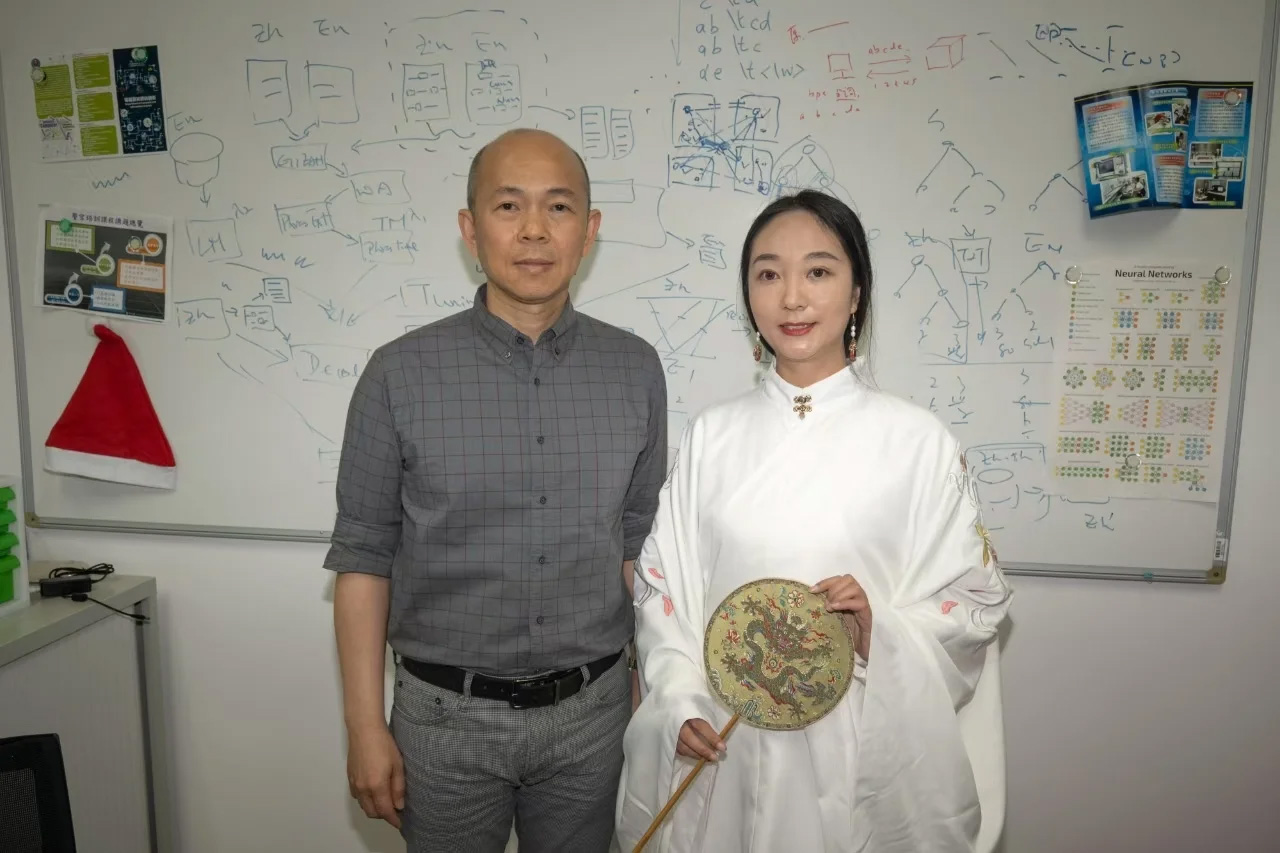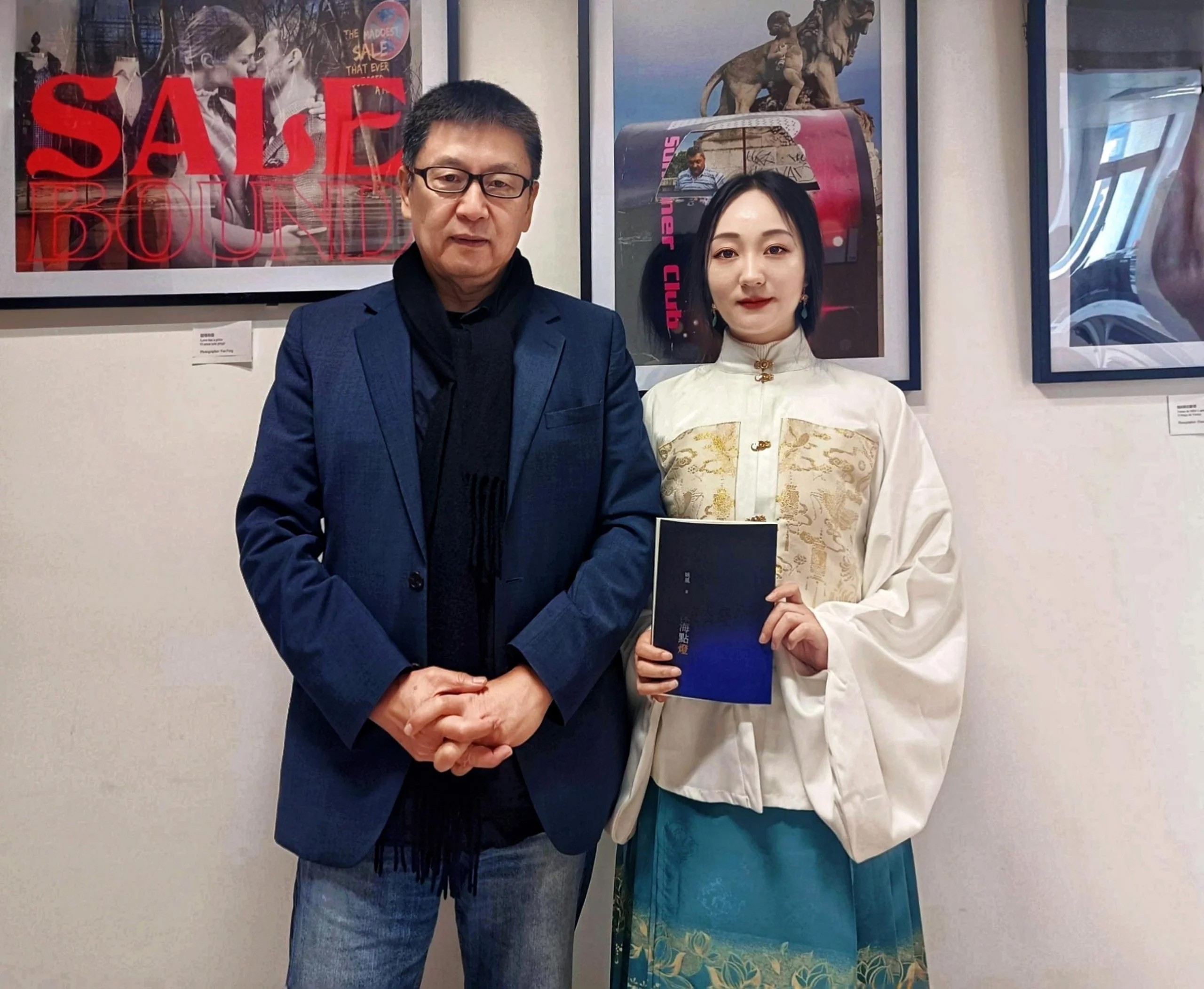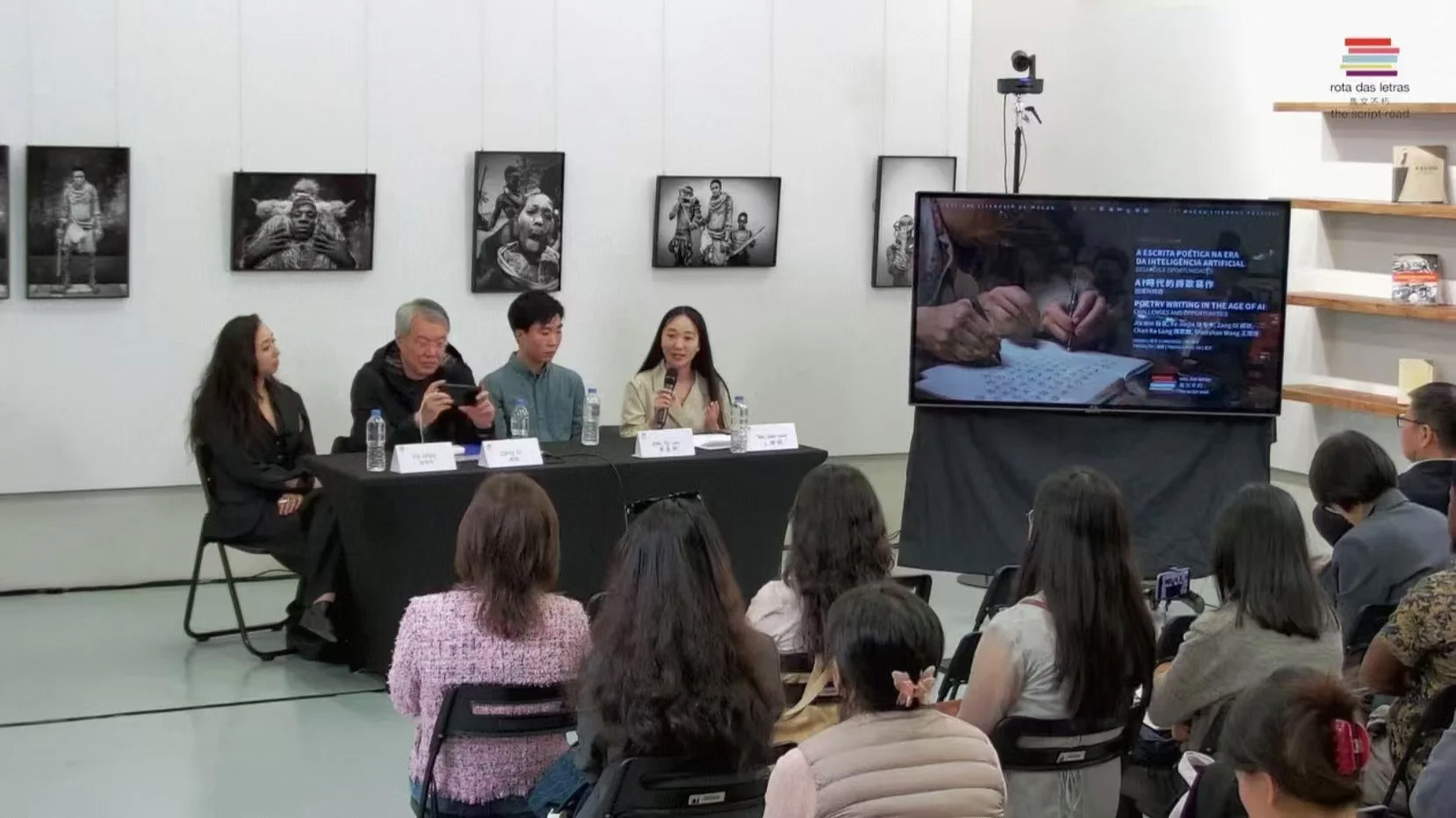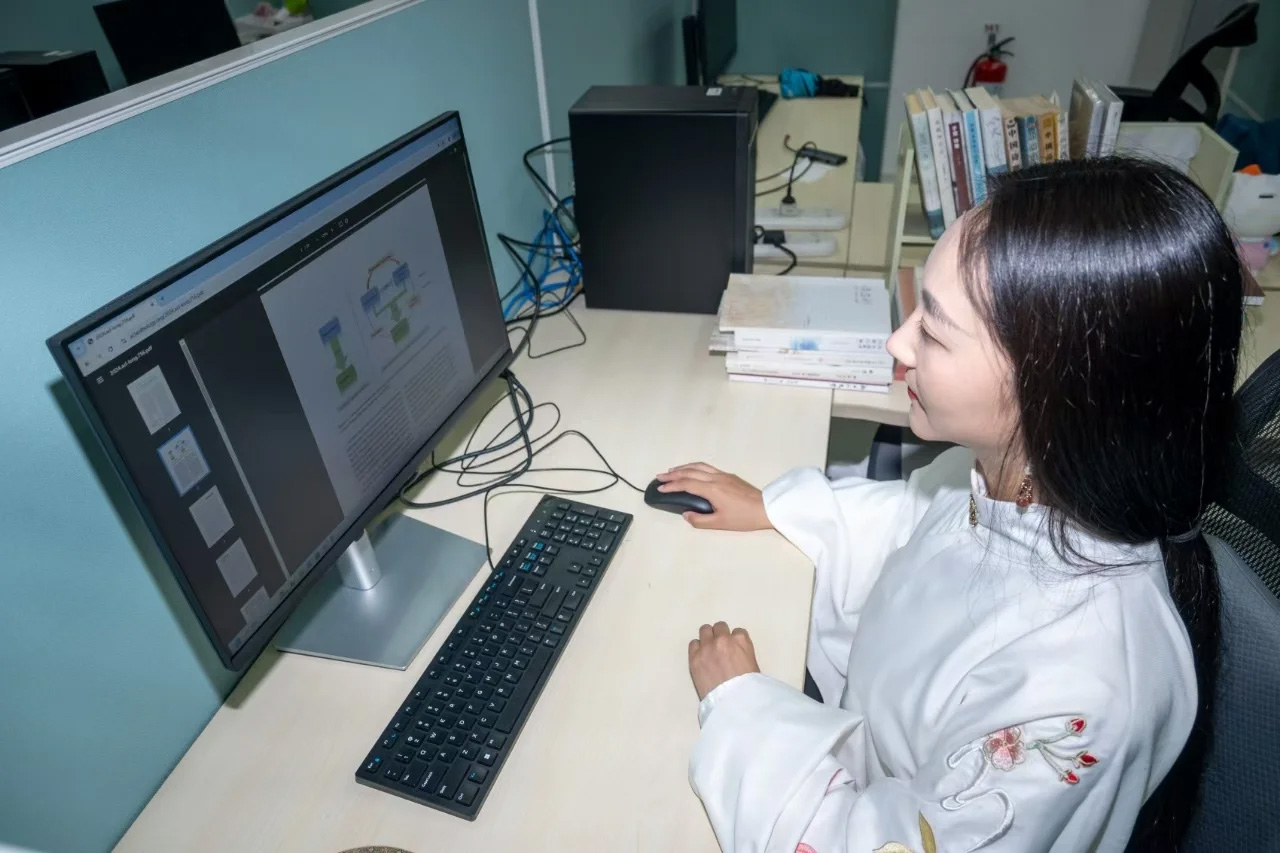From a small town in Yunnan to pursuing further education in Macao, from studying hydroelectric power to venturing into the field of machine translation, from publishing in the anthology China New Poetry Rankings to presenting her AI-powered poetry translation system at top-tier international computational linguistics conferences—Wang Shanshan, a doctoral student at the University of Macau (UM), embodies the creative synergy between literature and science. Wang has produced more than one thousand poems and multiple research breakthroughs. As she programmes AI to capture poetic quality when translating poetry in order to bring the romance of poetry to another language, it is clear that literature and science, two seemingly unrelated disciplines, can actually merge in extraordinary ways. Perhaps, through Wang’s research, her dream of bringing undiscovered masterpieces in Chinese literature to the world stage might just become a reality.
Rising as an interdisciplinary poet
Last month, at a prestigious literary event in Beijing—the awards ceremony of the inaugural global Chinese poetry competition organised by China Media Group and other leading institutions—Wang, in her hanfu, stood out among the award recipients. Her set of poems, ‘The Ever Falling Rain’ (《雨未停》), triumphed over 68,000 entries around the globe and won a poetry award in the university category. Unlike the conventional image of a poet immersed solely in the arts, Wang is actually an interdisciplinary poet—she is a doctoral student in computer science in UM’s Faculty of Science and Technology. The poetry competition attracted 10,955 participants from 31 countries and regions, and Wang broke the stereotype of a poet by producing extraordinary literary work with a mixed background in the humanities and sciences.
Hailing from Yunnan, Wang is a rising star in the literary circle. She is a member of both the Yunnan Writers Association and the Poetry Institute of China, and has been named an ‘Outstanding Writer’ by the journal China Postgraduates. Her work has been published in leading literary journals such as Shikan (《詩刊》) and Xingxing (《星星》), included in anthologies such as China New Poetry Rankings, and honoured with accolades such as ‘Top Ten Rising Chinese-Language Poets in 2024’. Some of her poems have even been translated into English and Spanish, reaching audiences far beyond China’s borders.
In 2019, Wang left her hometown to pursue a master’s degree and later a doctoral degree at UM. Over the past six years in Macao, she has maintained her enthusiasm for writing poetry. Notably, Wang was referred to for the first time as a ‘Macao poet’ in a news article about her recent win of the poetry award. ‘This title feels like a recognition for my continuous work in the poetry field. I’m grateful to be able to maintain my identity as a poet in Macao, and I’ll keep writing for as long as I can,’ she says.
Conducting research on AI poetry translation under the guidance of two mentors
Wang’s academic journey began far from the world of poetry—she studied energy and power engineering at Kunming University of Science and Technology, specialising in hydroelectric power. Yet, driven by her passion for poetry, she changed her research focus at UM, shifting from engineering to computer science. She dedicated herself to interdisciplinary research on AI-powered poetry translation under the guidance of Associate Professor Wong Fai in the Faculty of Science and Technology, a pioneer in the field of machine translation in Macao.
‘I decided to shift my research focus to computer science at UM and I was determined to excel in my studies,’ says Wang. With this resolve, Wang combined her literary flair with cutting-edge research in natural language processing (NLP). UM’s Natural Language Processing & Portuguese-Chinese Machine Translation Laboratory (NLP²CT Lab) became her testing ground, where she applied deep learning techniques to poetry translation under the supervision of Prof Wong. Wang’s work resulted in an innovative machine translation method for poetry, alongside a new set of evaluation metrics specifically tailored for AI-powered poetry translation. This ground-breaking research was presented at the Machine Translation Summit (MT Summit) 2023, opening a new avenue for the field.
‘For the progress I’ve made, I have to thank Professor Yao Jingming in the Department of Portuguese—who is also known by his pen name Yao Feng—for his guidance,’ Wang says. During the development of her machine translation system, Prof Yao provided valuable guidance on literary theories. ‘He didn’t just teach me how to grasp the essence of a poem—more importantly, he instilled in me a spirit of grit and innovation.’
Interestingly, what Wang did not know at first was that Prof Yao was the very poet she had admired since secondary school. ‘During a meeting, I noticed a signed poetry collection on Prof Yao’s desk, and it dawned on me as if I had discovered a beautiful secret,’ she adds.
‘Prof Yao often says that the most difficult part of translating poetry is preserving its essence. And the need to take into account the cultural connotation in both the source and target texts has completely changed my understanding of poetry translation,’ says Wang. Under the mentorship of Prof Wong and Prof Yao, Wang has developed a unique research perspective in AI-powered poetry translation, and her latest research ‘What is the Best Way for ChatGPT to Translate Poetry?’ has been accepted for the Annual Meeting of the Association for Computational Linguistics (ACL) 2024, a top-tier computational linguistics conference. ‘The free verse of modern poetry poses a greater challenge to AI-powered translation system than traditional poetry with regulated verse, as it places higher demands on the ability to capture the poetic quality,’ Wang explains.
Creating literary work in times of struggles
When Wang first stepped into the NLP²CT Lab six years ago, the challenges ahead seemed insurmountable. Moving from energy and power engineering to computer science was like entering another universe—especially for Wang, who knew nothing about programming, not even the basic concepts. To her, the lines of code seemed like an alien language, but retreat was never an option. Night after night, she stayed in the library until closing time, then moved to the learning commons to continue her studies. ‘Having learned programming techniques, I have more confidence in solving other challenges ahead, as if nothing can beat me,’ she says with a smile.
When Wang is under great pressure, literature is her haven. ‘I often sit on a bench by the lake on the UM campus, watching the water and waiting for inspiration,’ she recalls. ‘It is said that the most powerful work is often created during difficult times, and my experience has proven this to be true.’ Wang’s most productive creative period has coincided with her immersion in the throes of research. During her time at UM, Wang has written 400 poems, 160 of which have been published in print and 43 of which directly or indirectly depict Macao. Unlike typical evocations of the city’s glamour, Wang’s verses capture its quiet pulse and reveal its unvarnished character.
When Wang recalls moments of inspiration, one memory stands out: ‘When I was a master’s student, I often studied in the library and was always the last to leave. On my long walk back to the dormitory, I would hear frogs croaking. I used to sit on a bench by the lake and write until two or three o’clock in the morning. I ended up writing a poem called ‘Frog Leaps’ (《青蛙跳》).’
Bridging the divide of language
‘Great literary works should transcend language barriers and be appreciated by readers around the world,’ Wang explains. Today, Wang continues her pioneering NLP research in the NLP²CT Lab, developing machine translation technologies capable of preserving the essence of poetry.
Reflecting on the global presence of Chinese literature, Wang makes a poignant observation: ‘China has produced only one Nobel laureate in literature, and this is the result of multiple factors. In particular, language remains the most immediate barrier between our literary treasures and international audiences. For Chinese works to truly reach the world, it is imperative to break down linguistic barriers through quality translation.’
This belief has led Wang to embark on an ambitious mission: to develop a free and open-access literary translation system. Her goal goes beyond technical innovation—it is a mission of cultural dissemination. ‘I want to create a translation system that genuinely captures the essence and poetic quality of poetry, giving undiscovered masterpieces a chance to shine globally,’ she says.
Source: My UM Issue 144
從雲南小城遠赴澳門求學,從水力發電研究轉向機器翻譯領域,從榮登《中國新詩排行榜》,到站在國際計算語言學頂級會議上介紹詩歌AI翻譯系統,澳大博士生王珊珊用她逾千首詩作和多項研究成果,詮釋了文學與科學相輔相成的創造性力量。當她敲下讓AI學會翻譯詩歌「詩意」的程序代碼,當她在詩歌中描繪算法世界的浪漫想像,足以令我們明白,文學與科學從來不是非此即彼的選擇,而是能在碰撞中綻放出獨特的花火,或許真的能實現這位小妮子「讓中國尚未成名的文學作品走向世界」的夢想。
跨界女詩人的成長之路
上月,一場由中央廣播電視總台等權威機構主辦的文學盛會——首屆全球華語詩歌徵集活動頒獎典禮在北京舉行,一位身穿漢服的年輕女孩格外引人注目。不同於傳統印象中文采斐然的詩人形象,這位憑著組詩《雨未停》從全球68,000餘首詩歌作品脫穎而出、問鼎「丁香詩會校園詩歌獎」的女生,竟是澳大科技學院計算機科學專業博士生。在這場匯聚31個國家和地區、10,955位作者投稿的賽事中,王珊珊用實力打破人們對文理界限的固有認知,綻放令人驚訝的文理融合之美。
來自雲南的王珊珊是文壇新星,其不僅是雲南省作家協會會員、中國詩歌學會會員,還曾獲《中國研究生》雜誌評為「優秀撰稿人」。她的作品常見於《詩刊》《星星》等權威文學期刊,入選《中國新詩排行榜》等重要選本,更斬獲「2024年度十佳華語新銳詩人」等殊榮,多首詩作被譯為英語和西班牙語,在海外傳播。
2019年,王珊珊離鄉赴澳,於澳門大學攻讀碩博士學位。在澳門求學的六年間,她始終保持創作熱忱,筆耕不輟。有趣的是,這次獲獎報導中她首次被稱為「澳門詩人」。王珊珊感觸地說:「這稱呼是對我堅持創作的一種認可,我很感恩能在澳門這片土地延續詩歌夢想,我會一直寫下去。」
兩位導師引領的AI詩譯旅程
王珊珊本科就讀於昆明理工大學能源與動力工程專業,主攻水力發電方向。出於對詩歌的熱愛,王珊珊在澳大開啟了跨界轉型之路,她追隨被譽為「澳門機器翻譯研究的第一人」的澳大科技學院副教授黃輝,從工科轉向計算機科學,聚焦於詩歌AI翻譯領域。
「既然選擇到澳大攻讀計算機科學,我就一定要把它讀好。」帶著這份堅定的信念,王珊珊將自己的文學特長與自然語言處理的新技術研究相結合。澳大自然語言處理與中葡機器翻譯實驗室(NLP²CT)為她的研究提供了理想平台,在身兼實驗室主任的黃輝教授指導下,王珊珊將深度學習技術應用於詩歌翻譯領域,成功研究出一種創新的詩歌機器翻譯方法。她還提出了一套新的專門用於詩歌AI翻譯的評估指標。。這項突破性成果發表於2023年機器翻譯峰會(MT Summit),為詩歌機器翻譯開闢了新路徑。
「這項工作的成功進展,特別要感謝葡文系姚京明教授(筆名姚風)的指導,」王珊珊強調道。原來,在系統開發過程中,姚教授提供了關鍵的文學理論指導。「姚老師不僅教會了我如何『理解』詩歌的靈魂,更重要的是鼓勵我培養永不言棄、勇於創新的精神。」
有趣的是,王珊珊最初並不知道這位給予她悉心指導的姚京明教授,就是她中學時代就仰慕的著名詩人姚風。「直到有一次討論會,我看到姚教授桌上的詩集署名,才恍然大悟,」她回憶道,「那種感覺就像發現了一個美麗的秘密。」
「姚老師常說,詩歌翻譯最難的是保留原作的神韻,」王珊珊回憶這段奇妙的師生緣分時說道,「這種跨文化的思考方式,讓我對詩歌翻譯有了全新認識。」在兩位導師的聯合培養下,王珊珊在AI詩歌翻譯形成了獨特的研究視角,其最新研究《What is the Best Way for ChatGPT to Translate Poetry?》(論ChatGPT詩歌翻譯的最優方法)被國際計算語言學頂級會議ACL 2024收錄。她指出:「現代詩的自由性對AI翻譯提出更高要求,相比格律詩,它更考驗機器對詩意的捕捉能力。」
艱難時刻中的文學淬煉
回想起六年前剛踏入澳大NLP²CT實驗室時,置於她面前的,是巨大的學術挑戰。從能源與動力工程到計算機科學工程,完全是兩個世界,她甚至連最基本的編程概念都不了解。面對屏幕上密密麻麻的代碼,如同看天書一樣。但她沒有選擇退縮,在無數個挑燈夜戰的日子裡,王珊珊總在圖書館待到午夜關門,隨後轉戰公共學習空間繼續埋首鑽研。「攻克計算機科學這個難關後,我覺得人生沒有甚麼事情是我做不到的了。」她笑說。
壓力最大時,王珊珊選擇在文學中尋求慰藉。「有時我會坐在澳大湖邊的椅子上,靜靜凝視湖面,尋找創作靈感。」她微笑著說,「許多人說,最精彩的作品往往都是在最艱難的時刻寫出來的,我的經歷正正驗證了這句話。」學術上的奮鬥歲月,也成為她詩歌創作的高峰期,在澳大期間,她創作了四百首詩,其中約160首發表於紙質刊物,43首直接或間接描寫澳門。澳門風物成為了她的書寫對象,相比起澳門精彩繁華的一面,她更喜歡它的生活氣息,探尋小城原本的面貌。
最令她難忘的是深夜從圖書館歸途中的靈感時刻:「讀碩士時經常是最後一個離開圖書館的人。走過回宿舍的那段長路時,總能聽到蛙鳴。我常坐在湖畔的長椅上寫作到凌晨兩三點,後來還寫了一首叫《青蛙跳》的詩。」
跨越語言的藩籬
「真正優秀的作品應該超越語言的界限,被全世界讀者欣賞。」如今,王珊珊在NLP²CT實驗室裡,繼續深耕自然語言翻譯領域,專注於開發能夠傳遞詩歌韻味的機器翻譯技術。
談到中國文學在世界舞台的處境,王珊珊有著深刻的見解:「中國僅有一位諾貝爾文學獎得主,這背後是多重因素作用的結果,但語言障礙,無疑是橫亘在優秀作品與世界讀者之間最直接的壁壘。我們的文學瑰寶要真正走向世界,突破語言屏障、打造優質的翻譯橋樑是一個關鍵的課題。」
基於這個認知,促使她決心投身於一項雄心勃勃的計劃——開發一款免費開放的文學翻譯系統。她的目標不僅是實現技術突破,更是肩負起文化傳播的使命:「我要開發出能真正保留詩歌詩意和韻味的翻譯器,讓那些尚未成名的優秀作品也能獲得走向世界的機會。」
來源:《澳大人》第144期


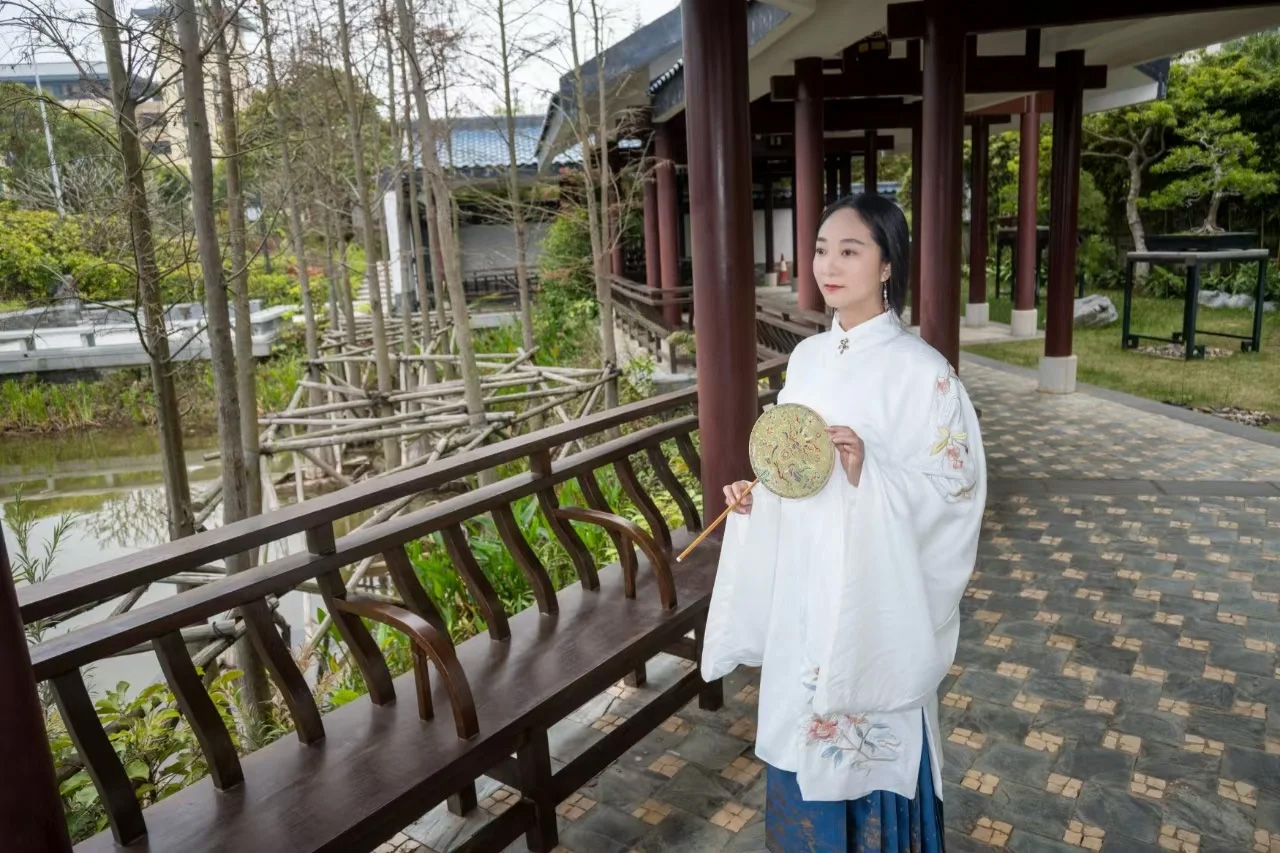
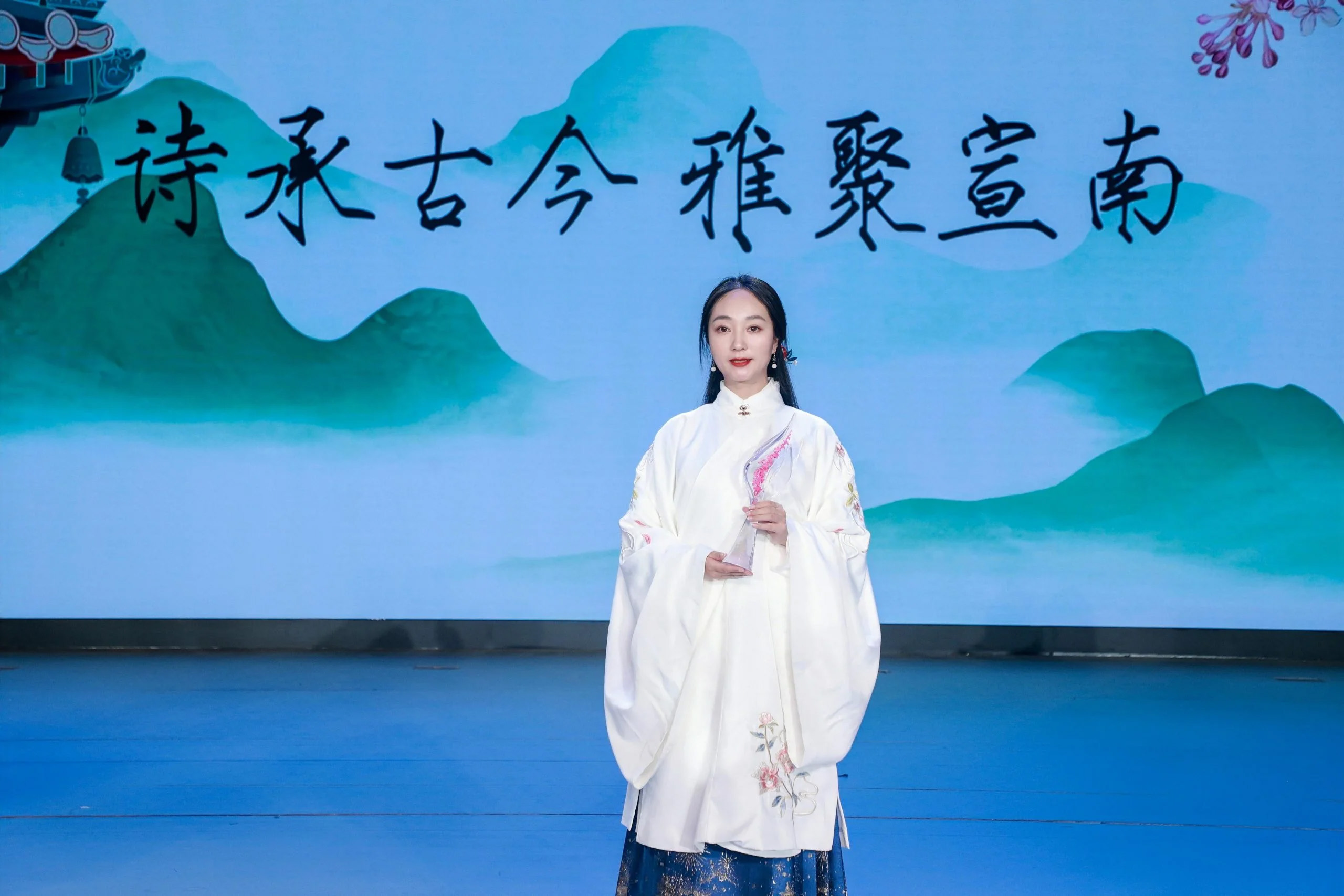
出席全球華語詩歌徵集活動頒獎典禮_resized-scaled-1.jpg)
